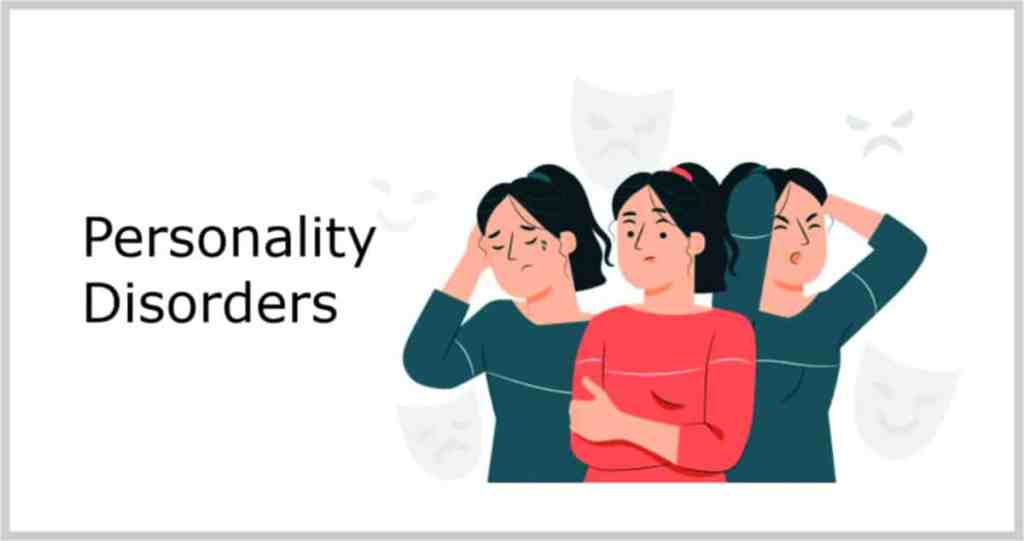Personality disorders are a type of mental illness that can affect how a person thinks, feels, and behaves. They have some abnormal or distorted patterns of thinking, feeling, and behavior. There are many different types of personality disorders. They can range in severity from mild to severe. If you think you might be suffering from a personality disorder, it is important to seek help from a professional. In this blog post, we will discuss the symptoms of some common personality disorders. We will also know what you can do to get help.
Contents
- 1 What Are Personality Disorders?
- 2 Different Types of Personality Disorders
- 2.1 Borderline Personality Disorder
- 2.2 Antisocial Personality Disorder
- 2.3 Narcissistic Personality Disorder
- 2.4 Paranoid Personality Disorder
- 2.5 Schizoid Personality Disorder
- 2.6 Dependent Personality Disorder
- 2.7 Avoidant Personality Disorder
- 2.8 Obsessive-Compulsive Personality Disorder
- 2.9 Histrionic Personality Disorder
- 3 Signs of Personality Disorders
- 4 Causes of Personality Disorders
- 5 Diagnosis of Personality Disorder
- 6 Treatment of Personality Disorders
- 7 Managing Personality Disorders
- 8 Conclusion
- 9 A Word From Therapy Mantra
What Are Personality Disorders?
 Personality Disorders are a type of mental disorder that affects how a person thinks, feels, and behaves. They are caused by damage to the areas of the brain that control personality. Sometimes these disorders are the result of childhood trauma. Other times, they are caused by physical or mental health concerns that have been going on for a long time.
Personality Disorders are a type of mental disorder that affects how a person thinks, feels, and behaves. They are caused by damage to the areas of the brain that control personality. Sometimes these disorders are the result of childhood trauma. Other times, they are caused by physical or mental health concerns that have been going on for a long time.
People who suffer from personality disorders often feel very alone and struggle to deal with everyday life. They may also be depressed and anxious about their condition. This can lead them to self-medicate using alcohol or drugs.
Sometimes people with personality disorders can be very destructive and violent. This is why it is important to get help if you think you may have a personality disorder. Treatment can help you learn how to cope with your condition and live a healthier life.
Different Types of Personality Disorders
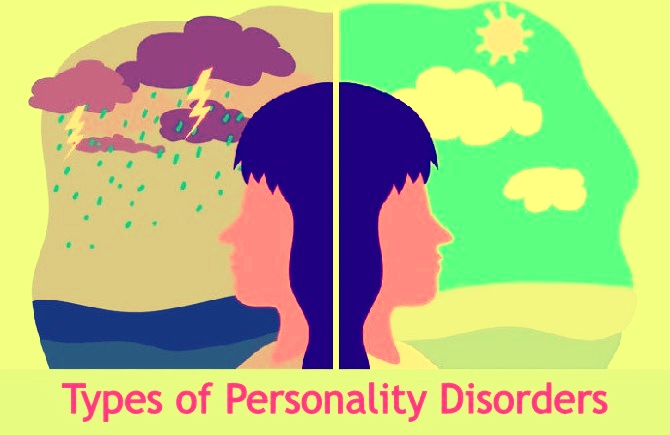
There are ten different types of personality disorders. Each one has different symptoms and some common as well. The three most common types are:
Borderline Personality Disorder
People with Borderline Personality Disorder (BPD) have problems regulating their emotions. They often act impulsively and engage in risky or dangerous behaviors. This is without thinking about the consequences.
They also have an unstable view of themselves and others. This can lead to extreme mood swings and angry outbursts.
People with Antisocial Personality Disorder (ASPD) are prone to lying, stealing, fighting, gambling away money they don’t have on hand, drinking heavily when not taking drugs such as cocaine or marijuana. This could potentially impair judgment further. In short, leading a life that is disruptive to society as a whole.
They often have difficulty maintaining relationships due to their lack of empathy for others and tendency towards manipulation or disregard for other people’s feelings. This disorder usually begins during childhood or early adolescence and is more common among men than women.
Narcissistic Personality Disorder
People with Narcissistic Personality Disorder (NPD) have an inflated sense of self-worth and believe they are superior to others. They need constant attention and admiration from others and can be very manipulative.
They also have a fragile ego which can lead to anger and jealousy when they don’t get the attention they want.
Paranoid Personality Disorder
Paranoid Personality Disorder is marked by suspicion of others and a tendency towards mistrust. Those who suffer from this condition tend to think that everyone else is out to get them.
They may also have an excessive need for control over other people’s actions, which can lead them down the path of becoming abusive in relationships or work environments where they feel threatened by someone else’s success or power position within the organization structure hierarchy-level dynamics (i.e., being fired because one does not like their boss).
Schizoid Personality Disorder
People with Schizoid Personality Disorder are introverted and prefer spending time alone rather than interacting socially with others. They lack empathy for other people, but they don’t seem bothered by this fact either way – it’s just how they’re wired psychologically speaking as human beings biologically wired for empathy or not.
They may also be detached from their emotions and have difficulty expressing them in an appropriate way when interacting with others socially, especially if situations are stressful for whatever reason which could lead someone to become overwhelmed.
Dependent Personality Disorder
Dependent Personality Disorder is characterized by a need for reassurance from others and an inability to make decisions on one’s own. People with this condition may also be clingy or overly dependent on their partner in relationships, which can lead them down the path of becoming abusive if they feel threatened by someone else’s success or power position within the organization structure hierarchy-level dynamics (i.e., being fired because one does not like their boss).
Avoidant Personality Disorder
People who suffer from Avoidant Personality Disorder are extremely socially anxious and fear rejection at all costs. They tend to avoid social situations where possible due to feelings of insecurity about themselves – even when there isn’t any objective reason why they should feel this way except perhaps some kind of childhood trauma which has led to them feeling like they’re not good enough.
They may also have low self-esteem and believe that they are not worth other people’s time or attention – which can lead to feelings of loneliness and isolation.
Obsessive-Compulsive Personality Disorder
Obsessive-Compulsive Personality Disorder is characterized by a need for control and perfectionism. People with this condition are often very rigid in their thinking and behavior, which can lead to problems in relationships or work environments where things don’t go their way or they feel out of control.
They may also have difficulty delegating tasks or trusting others to do things the way they want them done. This can result in them doing everything themselves, leading to feelings of exhaustion and resentment from others who are forced to work under such conditions.
Histrionic Personality Disorder
Histrionic Personality Disorder is marked by a desire for constant attention from others. People with this condition may also be overly dramatic and theatrical in their mannerisms or appearance, which can lead to problems socially such as being unable to communicate effectively with peers due to an inability to connect on an emotional level (i.e., crying over spilled milk).
They might feel that they need someone else’s approval all the time because of their self-esteem issues; however, these individuals tend not to compromise when it comes down to making sacrifices just so everyone around them will like them more than themselves.
Signs of Personality Disorders

There are many signs of personality disorders, but they can all be summarized as follows:
Feeling Anxious or Depressed
Low self-esteem and insecurity about oneself. Feel like you have no control over your life; everything happens to you instead of making things happen for yourself. Feeling that others don’t understand where they’re coming from because they’ve never been there before – may lead them into thinking everyone else is against them somehow so it’s up to them alone.
Having Difficulty In Maintaining Relationships
Having difficulty maintaining relationships with other people due to feelings of loneliness or isolation which stems back from childhood trauma such as abuse or neglect by their parents (or another authority figure). Lack empathy towards other people who are suffering; unable to see how their actions might impact someone negatively without realizing the consequences until it’s too late. People who suffer from this condition tend to be very manipulative in order to get what they want out of someone else and may resort to things like blackmail or guilt-tripping others into doing their bidding for fear that something bad will happen if they don’t comply with demands put upon them by other people.
Emotional Instability
Sometimes there are sudden mood swings with no apparent reason which can be very confusing for friends and family members who are trying to understand why the person they care about is so volatile. Feeling like one moment you’re on top of the world then the next minute you’re plunged into a deep, dark hole with no way out.
Trouble With Concentration
This may cause problems at work or school. This is because they’re unable to focus on tasks that need completing. This is due to being distracted by thoughts of what’s happening around them (e.g., people talking nearby) and not having any control over how those things affect their state of mind. Sometimes they might feel like they’re going crazy. It is because intrusive thoughts just won’t go away.
Self-Harm or Suicide Attempts
This is a cry for help and should not be taken lightly. If someone you know is exhibiting any of the signs mentioned above, please get them professional help right away. Personality disorders can be very dangerous to people who have them because they don’t know what’s wrong with themselves and can’t get help until it’s too late. This is why it’s crucial to be aware of the signs and symptoms so that you can get help for yourself or someone you know as soon as possible.
Causes of Personality Disorders
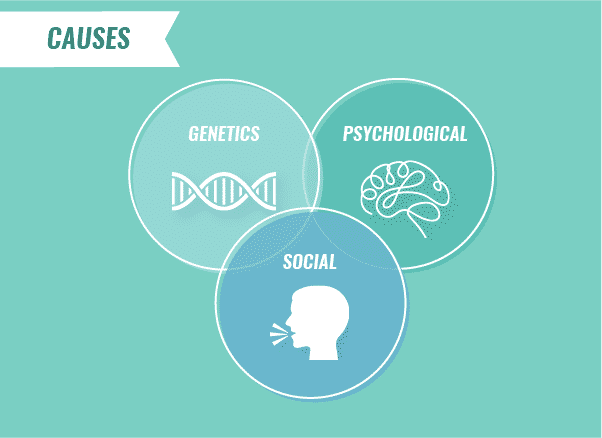
There are many causes of personality disorders, but they can all be summarized as follows:
Genetics
Some studies have shown that there is a genetic link to personality disorders. People who suffer from this condition may inherit them from their parents or grandparents. This is because it runs in families where multiple members are affected by similar issues over generations (e.g., alcoholism). This doesn’t mean that everyone who comes from a family history of mental health problems will develop one themselves. However, there is an increase in risk for those who do have relatives with these disorders.
Environmental Factors
This includes things like childhood trauma such as abuse or neglect by their parents (or another authority figure). This can lead them into thinking everyone else is against them somehow so it’s up to them alone. People who suffer from this condition may also experience traumatic events while growing up. These are such as bullying at school where someone bullies you. This is because they’re different in some way. Maybe they wear glasses and people made fun of their appearance or how smart they appeared to be. This is because intelligence isn’t something you can see. A person could also develop anxiety issues due to living in a chaotic environment. This is where there’s a lot of stress and little support.
Medical Conditions
There are some medical conditions that can cause personality disorders such as bipolar disorder, borderline personality disorder, and schizophrenia. If someone is suffering from any of these illnesses, it’s important to get them the help they need. This is because their mental health gets affected which could worsen the condition.
Trauma
Sometimes people develop this condition after going through something traumatic such as abuse, neglect, or a car accident. There are many types of trauma that can cause someone to develop certain personality disorders such as borderline personality disorder or post-traumatic stress disorder. It also means that the person may not even realize they have a problem because it’s something that happened in their past and they’ve since buried those memories deep down.
Peer Pressure
Peer pressure can also play a role in developing personality disorders. For example, someone may feel like they need to be perfect all the time and meet other people’s expectations which is impossible to do. This can lead to a lot of stress and anxiety because they’re never good enough in their own eyes. They might start using drugs or alcohol as a way to cope with these feelings, but that only leads to more problems down the road.
Diagnosis of Personality Disorder
 The diagnosis of a personality disorder is a tricky process. This is because it’s not as straightforward as diagnosing someone with, say, diabetes. There are no blood tests or scans that one can do to determine if someone has this condition. In order to make a diagnosis, the mental health professional will likely ask the person a lot of questions. This is about their thoughts, feelings, and behaviors.
The diagnosis of a personality disorder is a tricky process. This is because it’s not as straightforward as diagnosing someone with, say, diabetes. There are no blood tests or scans that one can do to determine if someone has this condition. In order to make a diagnosis, the mental health professional will likely ask the person a lot of questions. This is about their thoughts, feelings, and behaviors.
They’ll also want to know about the person’s family history and any major life events that you may have experienced. It’s important for the individual to be completely honest during this assessment. This is so that the therapist can get an accurate picture of what’s going on. Sometimes there are no clear answers and it’s a bit of a mystery as to why someone has this condition.
There are certain tests as well that can help to rule out other mental health conditions. These conditions are such as bipolar disorder, depression, and anxiety disorders.
Treatment of Personality Disorders
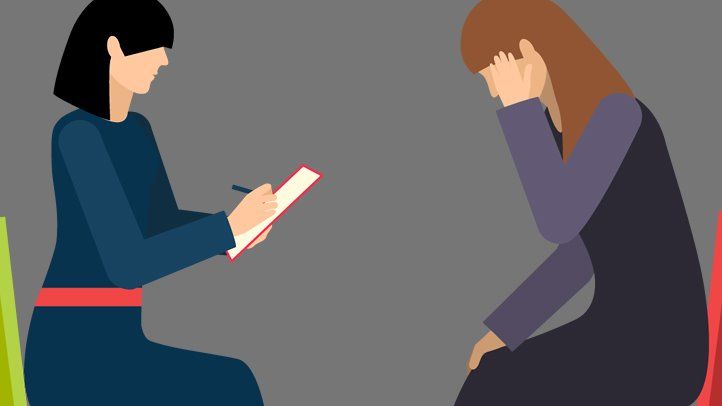
There are many treatment options for people with a personality disorder. Some of these include medications and psychotherapy.
Medications
There are certain medications that a doctor prescribes. These always help to treat symptoms associated with this condition. These include antidepressants, mood stabilizers, antipsychotics, benzodiazepines (Xanax), beta-blockers (propranolol), and anticonvulsants like valproic acid or carbamazepine. However, none of them are helpful in treating personality disorders themselves. So it’s up to your doctor what works best in their opinion on your situation as well as any other health conditions you may have that might interact negatively if you take them together at the same time.
Benefits of Medications
There are many benefits of medications for people with a personality disorder. The most obvious one is that it can help to stabilize their moods and control any symptoms that are causing them distress. This can lead to a more stable and happier life which is something everyone deserves.
Side-effects of Medications
There are many potential side effects of medications and it’s important to discuss these with your doctor before starting any new medication. Some common ones include weight gain, drowsiness, dry mouth, constipation, sexual dysfunction, and headache. It’s also important to be aware that some medications can be addictive so it’s crucial to take them exactly as prescribed by your doctor.
Therapy
 Therapy is also an option to help treat this disorder. Psychotherapy can be useful in helping you learn new ways of coping with stress, handling emotions better, and improving communication skills which will all benefit those who suffer from a personality disorder. Sometimes medication may be prescribed alongside therapy to help with the symptoms associated with this condition as well.
Therapy is also an option to help treat this disorder. Psychotherapy can be useful in helping you learn new ways of coping with stress, handling emotions better, and improving communication skills which will all benefit those who suffer from a personality disorder. Sometimes medication may be prescribed alongside therapy to help with the symptoms associated with this condition as well.
Some types of therapies that one can use in this situation include Cognitive Behavioral Therapy (CBT), Dialectical Behavioral Therapy (DBT), and Schema-Focused therapy.
- CBT is a type of therapy that focuses on the thoughts, feelings, and behaviors that are causing problems in your life. It helps you to identify these and then work on changing them so that you can feel better.
- DBT is a form of therapy that was specifically developed for those with Borderline Personality Disorder but it can be helpful for anyone with a personality disorder. It helps you to learn how to manage your emotions better, tolerate distress, and improve communication skills.
- Schema-focused therapy is another type of therapy that takes a more holistic approach to address the symptoms associated with personality disorders. It helps you to understand the underlying beliefs and patterns that are causing problems in your life and then work on changing them.
Managing Personality Disorders
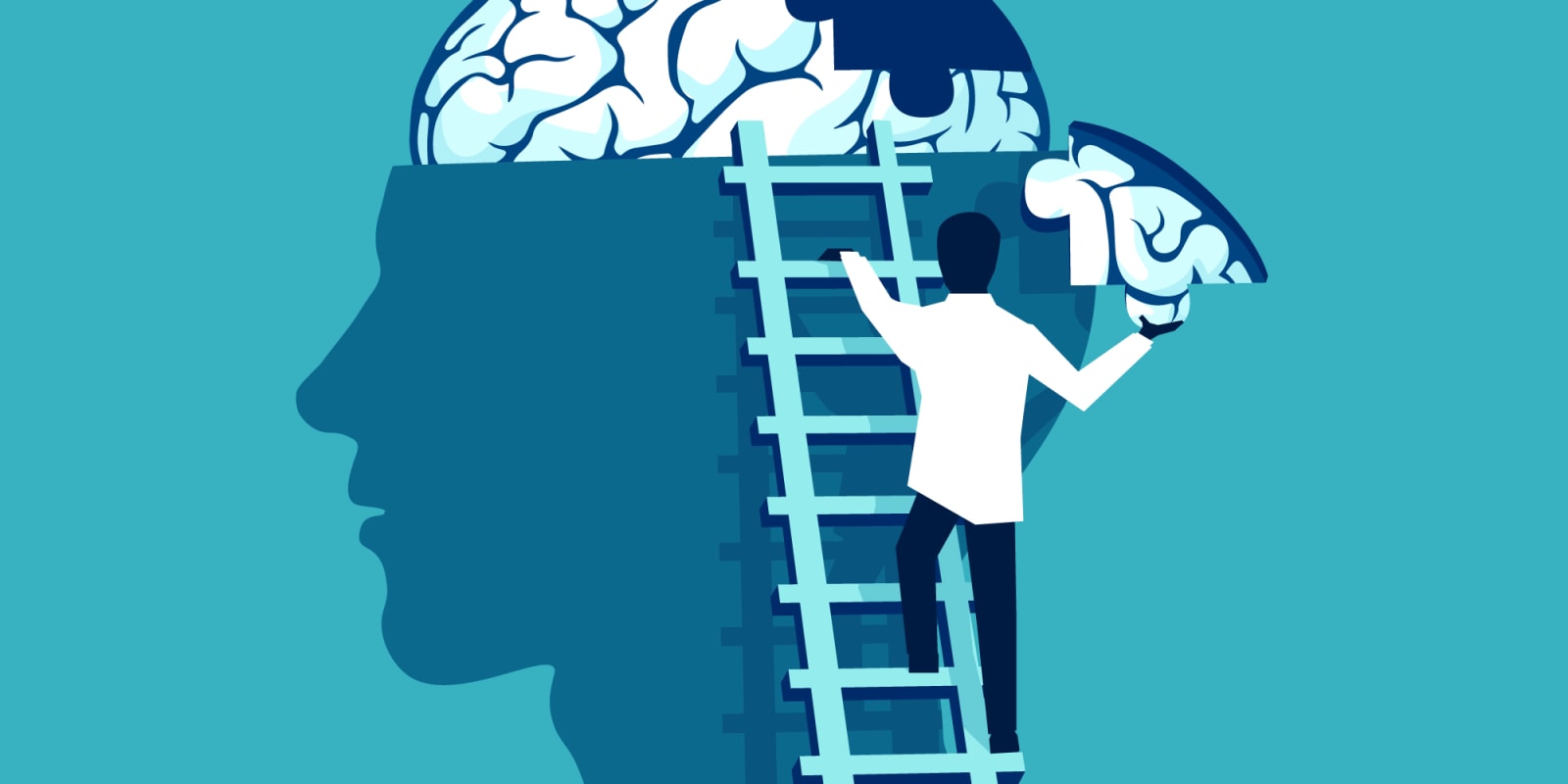
There are many ways to manage a personality disorder. Some of these are:
Eating Good Food
When you eat good food, your body is able to function better and feel healthier. This will help you cope with stress more easily as well as being less likely to become depressed or anxious when faced with difficult situations such as having an argument at work or school.
Exercising Regularly
When exercising regularly, increases the production of endorphins which make us feel happier overall so we’re less prone to negative emotions like depression and anxiety that can lead us down destructive paths in life (such as substance abuse). It’s also great because it helps strengthen bones muscles while burning calories too!
Getting Enough Sleep
When getting enough sleep every night on a regular basis allows our brains time off from thinking about problems during waking hours which may cause them to seem overwhelming when faced again during waking hours. This can help reduce stress levels and keep us more focused throughout the day so we’re less likely to make mistakes that could lead to negative consequences down the road.
Taking Care of Your Health
Sometimes we don’t realize how much our health affects our mood until we stop taking care of it. If you’re feeling down or depressed, try eating healthier foods and exercising more regularly to see if these changes help improve your moods too!
Staying Connected with Friends and Family
When staying connected with friends and family can reduce stress levels because they’ll know what’s happening in your life which means there will be less pressure on us when dealing alone with difficult situations like an argument at work or school. It also gives them the opportunity to help distract from any negative emotions that may arise during trying times such as grief over losing someone close while still allowing room for positive feelings like excitement about being able to attend an event together soon afterward (such as an upcoming graduation party).
Practicing Self-Care
There are many methods like yoga, meditation, and aromatherapy that can help us relax and de-stress. Taking some time for yourself every day to do something you enjoy (even if it’s just for a few minutes) can really help improve your mood and outlook on life in general.
Doing Yoga
One can also do yoga, which is a practice that combines physical poses, controlled breathing, and meditation or relaxation. Yoga is very helpful in reducing stress levels, improving moods and sleep quality, and increasing feelings of well-being. Sometimes doing yoga can also help with depression symptoms. These are such as sadness and low energy levels. It is by providing an outlet for venting negative emotions. This is while simultaneously improving flexibility.
Meditation

Meditation is another method that can help people to de-stress, improve moods and sleep quality, or increase feelings of well-being. Studies show that those who practice meditation regularly have fewer stress hormones circulating through their bodies compared with nonmeditators on average which means less anxiety when facing difficult situations like having an argument at work/school etc.
Doing Aromatherapy
Aromatherapy is a form of alternative medicine that uses essential oils extracted from plants to treat various medical conditions. This is very helpful in reducing stress levels, improving moods and sleep quality, and increasing feelings of well-being. When using aromatherapy, one should always make sure they’re not allergic to any of the ingredients first!
Listening to Music
It’s no secret that listening to music can help improve your moods by releasing happy hormones like dopamine and serotonin into your bloodstream. This is why so many people listen to music when they’re feeling down. It has the ability to instantly cheer them up without having to wait long at all.
Conclusion
Personality disorders are a type of mental illness that can affect how you think, feel, and behave. These can be a result of genetic and environmental factors. These can be difficult to treat without the help of a professional. Some common symptoms of personality disorders include feeling excessively sad or angry most of the time, having problems maintaining relationships with others, difficulty controlling impulses, and excessive worry or fear.
There are many methods one can use to help cope with the symptoms of a personality disorder. These are yoga, meditation, aromatherapy, listening to music, etc. It’s important to remember that everyone is different though so what works for one person might not work for another. The most important thing is to find what helps you relax and de-stress. This is so you can live a happier, healthier life.
A Word From Therapy Mantra
Your mental health — your psychological, emotional, and social well-being — has an impact on every aspect of your life. Positive mental health essentially allows you to effectively deal with life’s everyday challenges.
At Mantra Care, we have a team of therapists who provide affordable online therapy to assist you with issues such as depression, anxiety, stress, relationship, OCD, LGBTQ, and PTSD. You can take our mental health test. You can also book a free therapy or download our free Android or iOS app.
